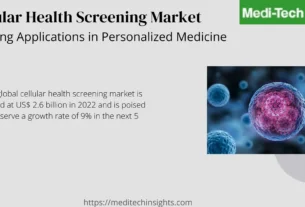
Global Healthcare IT Market Overview
The global healthcare IT market is positioned for rapid expansion, projecting a strong CAGR of 16% between 2025 and 2030. The sector’s growth is largely driven by the increasing adoption of electronic health records as regulatory frameworks mandate digital documentation across healthcare systems. Telehealth services are accelerating in demand due to the rising prevalence of chronic diseases and the need for continuous remote care.
Get Free Sample Report: https://meditechinsights.com/healthcare-it-market/request-sample/
Artificial intelligence and machine learning innovations are further reshaping clinical decision-making by enabling predictive analytics, early diagnosis, and personalized treatment pathways. Despite this significant progress, the market continues to face challenges such as high implementation and maintenance costs, rising data privacy concerns, and a persistent shortage of skilled IT professionals capable of managing complex digital healthcare ecosystems. These limitations slow the pace of digital transformation for many healthcare institutions, especially small and rural providers. However, ongoing investments, supportive government initiatives, and increasing focus on digital health infrastructure are expected to mitigate these obstacles over time, reinforcing the long-term growth potential of the healthcare IT sector.
Report Overview
Healthcare IT refers to the integration of information technology solutions designed to streamline healthcare delivery, improve patient outcomes, enhance operational efficiency, and optimize data management. The ecosystem includes electronic health records, telemedicine platforms, clinical decision support systems, health information exchanges, population health analytics, and revenue cycle management tools. These IT solutions play a crucial role in reducing medical errors, supporting real-time communication among care teams, and simplifying administrative tasks. The growing adoption of healthcare IT directly addresses critical industry challenges such as rising operational costs, inefficient workflows, limited interoperability, and increased demand for regulatory compliance. By enabling seamless data sharing and standardized documentation, healthcare IT ensures that providers can make informed clinical decisions while improving the overall patient experience. As healthcare systems worldwide face mounting pressure from growing patient populations and limited resources, IT-driven solutions remain central to modernizing care delivery and supporting long-term sustainability.
Key Driver: Expansion of EHR Systems
The growing expansion of electronic health record systems is one of the most influential drivers shaping the healthcare IT market. EHRs have become a foundational component of digital healthcare due to their ability to store, manage, and provide real-time access to comprehensive patient information. Policies such as the HITECH Act in the United States and a global push for interoperable electronic documentation have accelerated adoption rates in hospitals, specialty clinics, and primary care facilities. EHR systems enhance clinical accuracy by reducing documentation errors, improving data accessibility, and supporting better diagnostic and treatment decisions. They streamline communication among healthcare professionals, enabling coordinated care and reducing administrative redundancy. Integration of EHRs with clinical decision support tools, telemedicine platforms, e-prescribing modules, and patient portals further expands their capabilities. Although high upfront investment and complex implementation remain major barriers, the long-term benefits of improved workflow efficiency, higher care quality, and stronger regulatory compliance position EHRs as indispensable components of future healthcare delivery.
Rising Adoption of Mobile Health (mHealth) Applications
Mobile health applications represent a rapidly expanding segment of healthcare IT, driven by the widespread use of smartphones, growing digital literacy, and the increasing necessity of remote care models. mHealth solutions enable patients to manage various aspects of their health through digital platforms that offer appointment scheduling, medication reminders, digital consultations, symptom tracking, and access to medical records. These applications empower individuals to actively engage in preventive care and make informed health decisions. Healthcare providers increasingly use mHealth tools to remotely monitor patient conditions, especially for chronic diseases such as hypertension, diabetes, and cardiovascular disorders. Remote monitoring ensures timely intervention and reduces hospital readmissions by enabling early detection of complications.
The integration of mHealth platforms with wearable technologies such as fitness bands, continuous glucose monitors, and smartwatches further enhances their value. These wearables continuously collect data such as heart rate, oxygen saturation, sleep quality, and physical activity levels, providing a more comprehensive picture of patient health. Data captured through wearable devices can be seamlessly integrated into electronic records or analytics platforms, supporting personalized care and early risk identification. As healthcare systems shift increasingly toward patient-centric models and preventive healthcare, mHealth applications are becoming essential components of digital health strategies.
Key Request a free sample copy or view report summary: https://meditechinsights.com/healthcare-it-market/request-sample/
Market Drivers
Increasing adoption of Electronic Health Records (EHR)
Rising demand for telehealth services
Shift towards value-based care models
Advancements in AI and machine learning
Government initiatives promoting digital health
Attractive Opportunities
Increased focus on cybersecurity in healthcare
Need for cost-efficient healthcare delivery systems
Rising adoption of wearable and remote monitoring devices
Competitive Landscape Analysis
The global healthcare IT market is characterized by significant competition between established technology companies, healthcare-focused IT providers, and emerging startups. Companies in this sector are investing heavily in research and development to introduce advanced software solutions, strengthen cybersecurity frameworks, and improve interoperability across healthcare systems. Strategic mergers, acquisitions, and partnerships with healthcare organizations and government bodies help vendors expand market presence and accelerate the adoption of innovative digital solutions. These players focus on enhancing user experience, supporting seamless data integration, and offering scalable platforms suitable for organizations of varying sizes. Geographic expansion and localized solutions also form a major part of market strategies as digital healthcare adoption grows across emerging markets.
Key Players
• Philips Healthcare
• McKesson Corporation
• eMDs, Inc. (CompuGroup Medical)
• Veradigm Inc.
• Athenahealth, Inc.
• GE Healthcare
• Agfa-Gevaert Group
• Hewlett Packard Enterprise Development LP
• IBM
• Oracle
• SAS Institute, Inc.
• IQVIA
• SAP
• Accenture
About Medi-Tech Insights
Medi-Tech Insights is a healthcare-focused business research & insights firm. Our clients include Fortune 500 companies, blue-chip investors & hyper-growth start-ups. We have completed 100+ projects in Digital Health, Healthcare IT, Medical Technology, Medical Devices & Pharma Services in the areas of market assessments, due diligence, competitive intelligence, market sizing and forecasting, pricing analysis & go-to-market strategy. Our methodology includes rigorous secondary research combined with deep-dive interviews with industry-leading CXO, VPs, and key demand/supply side decision-makers.
